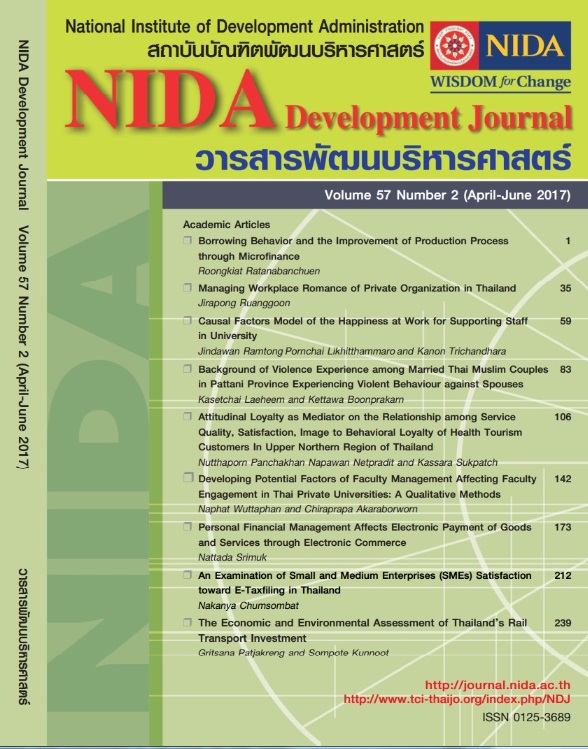Developing Potential Factors of Faculty Management Affecting Faculty Engagement in Thai Private Universities: A qualitative methods (การพัฒนาปัจจัยด้านการจัดการคณะที่ส่งผลต่อความผูกพันของอาจารย์ในมหาวิทยาลัยเอกชนในประเทศไทย: การวิจัยเชิงคุณภาพ)
Keywords:
Faculty engagement, Faculty mangement, Employee engagement, Work passion, Organizational citizenship behavior, Private University, ความผูกพันของอาจารย์, การจัดการคณะ, ความมุ่งมั่นในการทำงาน, พฤติกรรมการเป็นสมาชิกที่ดีขององค์กร, มหาวิทยาลัยเอกชนAbstract
This study aims to discover the potential factors of faculty management affecting faculty engagement in Thai private universities in order to develop a faculty engagement model. The phenomenology qualitative method and intensive literature review have been conducted. Five private universities in Thailand were selected by year of operated and student numbers. Seventeen purposive participants by using semi-structured method were interviewed. Tape recorded, transcripted, and line-by-line coded was used as data analysis.
The findings show four factors which are self-ideology factors (self-actualization, personal value and attitude, self-expert, altruism, and conscientiousness), job factors (autonomy, work-life balance, meaningful work, continuous learning and development opportunity, challenging job, growth, and compensation), organization factors (organizational justice and transparency, teamwork and collaboration, leadership and relationship with leader, and communication), and management factors (performance management, talent management, and succession management) affecting faculty engagement in private universities. The conceptual model has been developed basing on the research findings integrated with an intensive literature review, then re-factors and grouped the related factors and finally came up that faculty management factors consisted of work passion, organizational citizenship behavior, and talent management. The findings of this study can be used as a guideline for university’s administrator in private universities in order to prepare for faculty development and human resource development intervention effectively in order to gain a competitive advantage and sustainability in complexity world.
บทคัดย่อ
การศึกษานี้มีวัตถุประสงค์เพื่อพัฒนาปัจจัยที่เป็นไปได้ในการจัดการคณะที่ส่งผลต่อความผูกพันต่อองค์กรของอาจารย์มหาวิทยาลัยเอกชนในประเทศไทยเพื่อพัฒนาเป็นโมเดลของความผูกพันต่อองค์การของอาจารย์มหาวิทยาลัย การศึกษาครั้งนี้เป็นการบูรณาการวิจัยเชิงคุณภาพแบบปรากฏการณ์วิทยาควบคู่กับการทบทวนวรรรกรรม กลุ่มตัวอย่างของงานวิจัยในครั้งนี้ประกอบด้วย 5 มหาวิทยาลัยเอกชนในประเทศไทยโดยคัดเลือกจากจำนวนปีที่เปิดทำการเรียนการสอนและจำนวนของนักศึกษา การเก็บข้อมูลโดยการสัมภาษณ์แบบกึ่งโครงสร้าง จำนวน 17 คน โดยการบันทึกเทป จากนั้นทำการถอดเทปทุกคำพูด
ผลการวิจัยชี้ให้เห็นว่าปัจจัยในการจัดการคณะที่ส่งผลต่อความผูกพันต่อองค์การประกอบด้วย 4 ปัจจัยคือ ปัจจัยด้านอุดมการณ์ส่วนตัว (ความสมบูรณ์ของชีวิต คุณค่าและทัศนคติส่วนบุคคล ความเชี่ยวชาญของตนเอง การให้ความช่วยเหลือ และความสำนึกในหน้าที่) ปัจจัยด้านงาน (ความมีอิสระในการทำงาน คุณภาพชีวิตและการทำงาน คุณค่าของงาน การเรียนรู้และโอกาสในการพัฒนาอย่างต่อเนื่อง ความท้าทายในงาน ความเจริญก้าวหน้า และค่าตอบแทน) ปัจจัยด้านองค์การ (ความยุติธรรมและความโปร่งใสขององค์การ การทำงานเป็นทีมและความร่วมมือร่วมใจ ภาวะความเป็นผู้นำและความสัมพันธ์ระหว่างผู้นำ และการสื่อสาร) และปัจจัยด้านการจัดการ (การจัดการผลการปฏิบัติงาน การจัดการคนเก่ง และการจัดการผู้สืบทอดตำแหน่งงาน) ปัจจัยเหล่านี้มีผลต่อความผูกพันของอาจารย์ในมหาวิทยาลัยและจากการทบทวนวรรณกรรมสามารถสรุปได้ว่า ความผูกพันของอาจารย์มหาวิทยาลัยประกอบไปด้วย ปัจจัยด้านพลังความมุ่งมั่นในการทำงาน ปัจจัยด้านพฤติกรรมที่เป็นสมาชิกที่ดีขององค์การและปัจจัยด้านการจัดการคนเก่ง ผลการวิจัยสามารถนำไปใช้เพื่อก่อให้เกิดประโยชน์แก่ผู้บริหารของมหาวิทยาลัยเอกชนในการกำหนดนโยบายและกลยุทธ์ด้านทรัพยากรมนุษย์ได้อย่างมีประสิทธิภาพ อีกทั้งเพื่อเพิ่มขีดความสามารถในการแข่งขันและความยั่งยืนในการบริหารจัดการต่อไป





